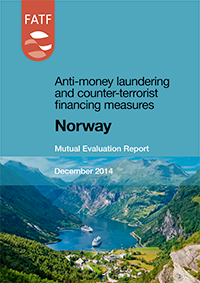Paris, 18 December 2014. Norway has taken some good initiatives to combat money laundering and terrorist financing, but needs to establish overarching policies and strategies, and address significant weaknesses in a number of key areas, according to the FATF's mutual evaluation of Norway.
Despite good legal foundations and sound institutions, the investigation and prosecution of money laundering is not a high priority for competent authorities in Norway, resulting in very few convictions for such offences.
Norwegian authorities are taking appropriate action to detect and disrupt terrorist financing and have taken significant measures to implement proliferation financing sanctions. However, weaknesses exist in the implementation of targeted financial sanctions relating to terrorist financing and proliferation financing and the lack of supervision is a concern.
Limited action has been taken since 2009 to update laws and other measures. A priority for Norway is to update and supplement its laws and guidance for preventive measures. Basic measures are being implemented, but effectiveness is variable, with banking, accountant and audit, and real estate sectors being stronger than other sectors, including the legal sector and other parts of the financial sector. There is a need for a stronger application of the risk-based approach. The frequency, scope and intensity of supervision of these sectors is not sufficient and sanctioning powers for non-compliance are limited.
Norway takes an open and collaborative approach to international cooperation and there is a transparent set of national registers with information on the ownership and control of companies when they are owned by Norwegians. However, Norwegian authorities are not able to get timely access to beneficial ownership information on companies incorporated in Norway when these companies are owned by foreign entities.
The President of the FATF, Roger Wilkins, said:
“The completion of a mutual evaluation report is a starting point for an assessed country to strengthen its measures to combat money laundering and terrorist financing. Norway’s mutual evaluation report identified areas where the authorities had established sound policies and institutions, but it also identified some significant weaknesses. The report gives clear recommendations to Norway on the priority actions it should take. Norway will now work towards addressing the identified weaknesses and I am confident that they will do so very successfully.”
The FATF is the global body responsible for setting and monitoring international standards on combatting money laundering and the financing of terrorism. A FATF Mutual Evaluation is a year-long peer-review conducted by an international panel of experts. The Mutual Evaluation Report provides a detailed and complete assessment of Norway’s system to combat money laundering and terrorist financing, and assesses Norway’s level of compliance with the FATF Recommendations. The report also includes recommendations to Norway on the improvements needed.
The FATF's mutual evaluation looks at measures ranging from law enforcement to financial supervision, and is the first comprehensive review of a country’s anti money laundering and terrorist financing system and the first to be completed using the revised FATF Recommendations adopted in 2012.
For further information, journalists are invited to contact Alexandra Wijmenga-Daniel tel. 33 1 45 24 95 23 in the Financial Action Task Force.



 Twitter
Twitter
 Facebook
Facebook
 Instagram
Instagram
 Linkedin
Linkedin
